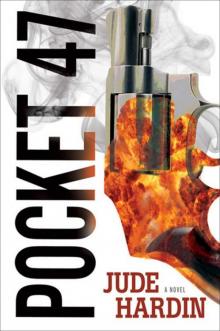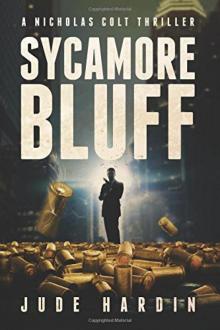- Home
- Jude Hardin
Ricochet: The Jack Reacher Experiment Book 8
Ricochet: The Jack Reacher Experiment Book 8 Read online
RICOCHET
THE REACHER EXPERIMENT BOOK 8
JUDE HARDIN
About RICOCHET
Rock Wahlman…
United States Navy Master at Arms, E-8, retired. Three and a half years have passed since he discovered that he is the product of a human cloning experiment, an exact genetic duplicate of a former Army officer named Jack Reacher.
Once a fugitive from justice—and a target for multiple hired assassins—Wahlman has settled into a new career as a private investigator. He has a wife named Kasey to come home to at night, a stepdaughter named Natalie starting college, and a cat named Alice who’s a little too clever for her own good.
In short, Rock Wahlman is a happy man.
But when a celebrity lookalike shows up at his office with a stalking complaint, things start going wrong in a hurry…
Table of Contents
About RICOCHET
1
2
3
4
5
6
7
8
9
10
11
12
13
14
15
16
17
18
19
20
21
22
1
You don’t need a map of Louisville to find Rock Wahlman’s house. Just follow the signs to Churchill Downs, take a left on Fifth, and look for the bungalow with the closed-in porch and the portable steel yard sign.
Wahlman Investigative Services.
The sign is nothing special.
The porch has a story.
A few years before Wahlman was born, a middle-aged couple with a couple of teenagers still in the house got talked into some new siding and an additional two hundred square feet of living space. Probably some sort of E-Z payment plan. Probably not as E-Z as the salesperson made it sound. The construction crew did a fine job, but the architectural design is never going to win any awards for curb appeal. The front façade looks like a giant shoebox with a door and a window cut into it. Like something drawn with crayons.
Soon after the project was finished, one of the teenagers won some sort of contest and got to meet a popular singer of the day, a guy named Jessie Reddington, one of those iconic megastars who still got radio play on certain stations forty-some years later. The teenager met Reddington right there in the renovated space that used to be the front porch. Right there in Wahlman’s office. Or so the story went. The neighbor who had told Wahlman about it tended to exaggerate.
Wahlman stood there on the front stoop and waved goodbye to his stepdaughter as she backed out of the driveway, off to attend an orientation session at one of the freshman dormitories at the University of Louisville. Kasey stood there beside him, brushing tears away with the back of her hand.
“It’s just a couple of miles down the road,” Wahlman said.
“I know, but it’s still sad. Don’t you think it’s sad?”
“What’s so sad about it?”
“My baby’s all grown up.”
Rock Wahlman and Kasey Stielson had gotten married on New Year’s Eve, 2099.
The dawn of a brand new century.
The dawn of a brand new life.
In a few months, they would celebrate their second anniversary. There would be parties and fireworks and all kinds of revelry all over the world, and it would be that way on every anniversary for as long as they lived. They planned to rent a hotel room with a view of the river and turn out the lights and open the drapes and pretend it was all just for them.
Kasey had chosen to settle in Louisville because of its proximity to Nashville, where her parents lived. It was close enough, but not too close, she’d said. Wahlman wasn’t particular about where they stayed, as long as they were together, and as long as there was a big enough population for him to make a living.
“I have a client coming by in a little while,” he said.
“You have a client? Really?”
“Don’t act like it’s such an unusual event.”
“You have to admit, it’s been pretty slow lately,” Kasey said.
“It’ll get better.”
“You keep saying that.”
“It will.”
There was a sycamore tree in the front yard. Some kind of bird was up in the branches, near the top, chirping nervously, hidden from sight by the fat leaves.
“I’m going out again today,” Kasey said. “I have several more interviews. In fact, I better get going. The first one’s at nine.”
“It’s not like we’re broke,” Wahlman said.
“I know. But I want to work. I need something to do.”
“Okay.”
“Who’s your client?”
“I’ll tell you about it at dinner tonight,” Wahlman said. “And you can tell me about your interviews.”
“And Natalie can tell us all about her orientation,” Kasey said. “And maybe I can finally talk her into staying here and commuting.”
Wahlman doubted it, but he didn’t say anything. He turned and opened the door and followed Kasey into the house.
2
The client was late.
Anxiously awaiting her arrival, Wahlman had been pacing from one end of his office to the other for thirty minutes or so. The fluffy ginger tabby they called Alice had marched alongside him for a while, but had grown weary of it and had curled up to take a nap on the bookshelf in the corner. Alice had shown up on the stoop one day back in June, and Natalie had let her inside and had fed her, and that was that. Now Alice was part of the family.
And like the rest of the family, she liked to eat on a regular basis.
Kasey was right. It had been slow lately. Wahlman had been thinking about getting some kind of side job, just to make ends meet. A job delivering pizzas or something. Kasey’s parents were wealthy. They were millionaires. But Wahlman refused to ask them for help, unless it was an emergency. He’d decided that he would make it as a private investigator, or that he would do something else. Lately it had been looking more and more like something else.
He looked at his watch, sat at his desk, grabbed a pencil from the ceramic teapot he used for a caddy and started drumming on the mousepad. He did that for a couple of minutes, and then he slid the pencil back into the teapot and got up and peeked through the blinds and saw one of the most famous movie stars on the planet climb out of a rusty old hatchback and step onto the sidewalk.
At twenty-nine, Janelle Pierce had already been nominated for seven Academy Awards and three Golden Globes. She hadn’t actually won any awards yet, but most of the critics seemed to think it was just a matter of time. She’d made an effort to disguise herself, but Wahlman knew it was her. The junk car and the bandana and the dark glasses weren’t quite enough. They didn’t cover that neck, and that chin, and those lips.
Janelle had grown up across the river, in Jeffersonville, and still visited the area frequently. Wahlman opened the door before she had a chance to knock.
“Are you Rock Wahlman?” she said.
“Yes. Come on in.”
Wahlman held the door while she stepped across the threshold. She pulled the glasses off first, and then the scarf. Her hair was lighter than it had been in her last movie. Her eyes were the color of the sky in April.
“Is that a church pew?” she said.
“Yes. Please, have a seat.”
The pew had been there when Wahlman bought the place. Seven feet long, solid oak. Wahlman figured it had a story too, but he hadn’t heard it yet. His client set her things down and nestled in by the armrest
closest to the door.
“I should probably go ahead and make it clear that I’m not her,” she said.
“Pardon me?” Wahlman said.
“I’m not her.”
“But on the phone you said—”
“I know what I said. And I know it’s not the right thing to do. But it makes life easier sometimes. Appointments. Tables at restaurants. Whatever.”
The resemblance was remarkable. Wahlman didn’t bother telling her that there had been no need for the deception, that his calendar was as open as a bourbon bottle on Derby Day.
“So who are you?” he said, reaching for a pencil and a notebook.
“Rokki Rhodes,” she said.
“Like the ice cream?”
She spelled it. Wahlman wrote it down.
“What can I do for you, Ms. Rhodes?”
“You can call me Rokki.”
“Okay. Why did you decide to—”
“Someone’s following me,” she said.
“Someone’s following you?”
“Stalking. I guess that’s the word. I dance in a club. Some guy’s been coming to every show, sitting in front, staring at me the whole time.”
Wahlman drummed the pencil on the mousepad.
“Isn’t that what guys do in those kinds of places?” he said.
“He’s creeping me out.”
“Has he tried to talk to you? Has he approached you outside of the club?”
“No. He just sits there and stares.”
“Has he called or sent texts to your phone? Has he harassed you on social media? Anything like that?”
“No.”
“It doesn’t sound like he’s breaking any laws.”
“I know. That’s why I came to you instead of the police.”
“What exactly is it that you want me to do?” Wahlman said.
“Tell him to stop.”
“And if he doesn’t?”
“I want this guy out of my life. I want you to do whatever it takes.”
Wahlman drummed the pencil on the mousepad some more.
“Are you suggesting what I think you’re suggesting?” he said.
“Whatever it takes,” Rokki said.
“You want me to beat him up? Break some bones, maybe?”
“Whatever it takes.”
“Sorry. I don’t think I can help you.”
Rokki shifted in her seat.
“Why not?” she said.
“That’s just not the kind of thing I do,” Wahlman said.
He’d jumped through a lot of hoops to get his P.I. license. He’d driven down to New Orleans back in the summer of 2098 and had turned himself in on a variety of charges, including two counts of first-degree murder. He’d spent a day and a half in the detention center before posting bail, and he’d spent six months fighting the charges, represented by a struggling young attorney who took the case pro bono because of the publicity it was sure to generate. Once he’d been cleared of any wrongdoing, there was still a matter of having the records expunged before the state of Kentucky—or any other state in the Union—would accept an application for professional licensure. He’d jumped through a lot of hoops, and he wasn’t about to put his career in jeopardy by taking a job that involved intimidation—and maybe even physical violence—no matter how much he needed the money.
“Sorry I wasted your time,” Rokki said.
“Me too,” Wahlman said.
Rokki stood and put the sunglasses back on.
“I’m working tonight,” she said. “Laupin’s. Stop by if you change your mind.”
She exited the office. Wahlman stood and peeked through the blinds, saw her climb into the rusty old hatchback and drive away.
Alice was still snoozing on the bookshelf.
Wahlman walked back to his desk and opened a browser and wrote down some phone numbers of some of the pizza places in the area.
The ones that delivered.
3
Wahlman followed Kasey into the kitchen. She was carrying a large brown paper bag. One side of the bag was darkened with something that had spilled out a little.
“Chinese again?” Wahlman said.
“Yeah. Sorry. I have too much going on to think about cooking anything tonight.”
“Too much going on?”
“I got a job,” Kasey said, lifting one of the greasy food cartons out of the greasy paper bag.
“What kind of job?” Wahlman said.
“I’m going to be driving a route for a vending machine company. Collecting money from the machines, maybe doing some light maintenance sometimes. I have to go to Lexington for two days of training. I have to be there at eight o’clock in the morning, so—”
“You’re going to be working in Lexington?”
“No. Here in Louisville. But the training’s in Lexington.”
“Oh.”
“Where’s Natalie?” Kasey said.
“She called a while ago,” Wahlman said. “She’s staying at the dorm tonight.”
Kasey stopped pulling cartons out of the bag.
“What?” she said. “Already? She hasn’t even taken any of her things over there yet.”
“She has a change of clothes with her. She said she’ll start moving her stuff tomorrow.”
“Classes don’t start until next week. Why would she want to—”
“She said something about a rush party at one of the sorority houses.”
“And you told her that was okay?”
“She didn’t really ask for permission,” Wahlman said. “She just called to let us know that she wouldn’t be home tonight.”
“I don’t like the idea of her going to some wild party,” Kasey said. “And that only leaves us with one car. The only reason I agreed to let her stay in the dorm in the first place was so we wouldn’t—”
“When she comes home tomorrow, I’ll help her move, and then I’ll keep the car,” Wahlman said. “It’s not that big of a deal. I don’t need to go anywhere in the morning anyway.”
“I thought you had a client.”
“Not anymore.”
“What happened?”
Wahlman explained what had happened.
“You don’t have to go to work for that vending machine company,” he said. “I’m going to start looking around for a side job.”
“What kind of side job?”
“Delivering pizzas or something.”
Kasey sighed.
“That would suck,” she said.
“So would not being able to make the mortgage payment,” Wahlman said.
“It’s not like we’re going to be out on the street or anything. Every time I talk to Daddy, he makes it clear that—”
“You know how I feel about taking money from your parents,” Wahlman said.
“Yeah. I know. Anyway, I’m going to go ahead and take the job I was offered today. Which means that I’m going to have to get up and leave the house very early tomorrow morning.”
“How early?”
“At least by six. I’ll be staying at a hotel in Lexington tomorrow night. I’ll call you and let you know which one. And don’t worry. The company’s paying for everything.”
Wahlman thought about trying to talk her out of taking the job, but he didn’t. Once Kasey had her mind set on doing something, she did it, no matter what. It would have been like trying to talk a train off its track.
Wahlman opened a cabinet and pulled out some plates.
“Let’s eat,” he said. “Before it gets cold.”
4
Kasey was long gone by the time Wahlman climbed out of bed the next morning. He looked out the window and saw that the driveway was empty, remembered that Natalie still had the car he usually drove. He figured he would call her in an hour or so, try to get her things moved over to the dorm fairly early, try to get out and put in some applications for employment. Better in person than online, he thought. Especially at places like pizza joints.
Wahlman switched on the television on t
he way to the kitchen. The news was on. The weather forecast. Sunny and hot, with a chance of afternoon thundershowers. Wahlman wondered what kind of credentials you needed to be a weatherperson. He figured he could guess as well as the people working at the local news channels. Maybe that could be his new career. And now, Rock Wahlman with the weather. It had a nice ring to it, he thought. He was dipping a measuring scoop into a can of coffee when the weather report was cut short. Some sort of breaking story. Something about a hiker finding the body of a celebrity lookalike up in Iroquois Park, up in the woods, near one of the horseshoe-shaped viewing areas known among locals as the lookouts.
Wahlman’s jaw dropped. He stepped into the living room and turned the volume up on the television. The lookalike had been stabbed. Multiple times. Dozens of shallow wounds. The hiker who’d found her had thought she was actually Janelle Pierce. The reporter covering the story seemed to be disappointed that she wasn’t. He never actually said the words just a stripper, but that was the vibe you got. He made sure to mention how slow and painful her death had probably been, just in case anyone listening hadn’t figured that out.
Wahlman slumped into the armchair in the corner, immediately started wondering if he could have prevented the tragedy. Rokki Rhodes had come to him for help, and he’d told her no.
And now she was dead.
Of course none of it was actually Wahlman’s fault. He knew that. But he’d been a Master–At-Arms in the United States Navy for twenty years. The law enforcement officer inside of him just couldn’t stand back and watch from the sidelines.
He needed his car. He tried to call Natalie. No answer. He left a message, went back to the kitchen, glanced over to make sure there was plenty of food in Alice’s food dish and plenty of water in her water bowl, padded to the bedroom and put some clothes on and headed outside. He walked to the corner and took a left at the same stop sign Rokki had taken a left at yesterday, made his way up to the car lot. Charlie Freckman’s Used Cars. Wahlman helped Charlie with security sometimes. In exchange, Charlie allowed him to take extended test drives sometimes.

 Ricochet: The Jack Reacher Experiment Book 8
Ricochet: The Jack Reacher Experiment Book 8 Blood Tattoo (A Nicholas Colt Thriller Book 5)
Blood Tattoo (A Nicholas Colt Thriller Book 5) Racked (A Lt. Jack Daniels / Nicholas Colt mystery)
Racked (A Lt. Jack Daniels / Nicholas Colt mystery) COLT (A Nicholas Colt Thriller)
COLT (A Nicholas Colt Thriller) Pocket-47 (A Nicholas Colt Thriller)
Pocket-47 (A Nicholas Colt Thriller) FUSED: iSEAL OMNIBUS EDITION (A Military Technothriller)
FUSED: iSEAL OMNIBUS EDITION (A Military Technothriller) THE JACK REACHER FILES: CHOKE 2 (Episode 2 in the CHOKE Series)
THE JACK REACHER FILES: CHOKE 2 (Episode 2 in the CHOKE Series) Snuff Tag 9 (A Nicholas Colt Thriller Book 3)
Snuff Tag 9 (A Nicholas Colt Thriller Book 3) THE JACK REACHER FILES: HOSTAGE
THE JACK REACHER FILES: HOSTAGE THE JACK REACHER FILES: THE GIRL FROM THE WRONG SIDE OF CORDIAL (with Bonus Thriller THE BLOOD NOTEBOOKS)
THE JACK REACHER FILES: THE GIRL FROM THE WRONG SIDE OF CORDIAL (with Bonus Thriller THE BLOOD NOTEBOOKS) 3 TERRIFYING THRILLERS
3 TERRIFYING THRILLERS The Jack Reacher Files: Fugitive
The Jack Reacher Files: Fugitive Key Death (A Nicholas Colt Thriller Book 4)
Key Death (A Nicholas Colt Thriller Book 4) SYCAMORE BLUFF (Prequel to THE JACK REACHER FILES: ANNEX 1) (A Nicholas Colt Thriller Book 8)
SYCAMORE BLUFF (Prequel to THE JACK REACHER FILES: ANNEX 1) (A Nicholas Colt Thriller Book 8) VELOCITY
VELOCITY Fire and Ice
Fire and Ice Sycamore Bluff
Sycamore Bluff Jack Reacher Files_Velocity
Jack Reacher Files_Velocity 357 Sunset
357 Sunset THE JACK REACHER FILES: CHOKE (Episode 1 in the CHOKE Series)
THE JACK REACHER FILES: CHOKE (Episode 1 in the CHOKE Series) Redline: The Reacher Experiment Book 6 (The Jack Reacher Experiment)
Redline: The Reacher Experiment Book 6 (The Jack Reacher Experiment) Fugitive
Fugitive Fire and ice dm-8
Fire and ice dm-8 American PI
American PI THE JACK REACHER FILES: ANNEX 1 (A Novel of Suspense)
THE JACK REACHER FILES: ANNEX 1 (A Novel of Suspense) THE JACK REACHER FILES: VELOCITY (with bonus thriller CROSSCUT)
THE JACK REACHER FILES: VELOCITY (with bonus thriller CROSSCUT) The Reacher Experiment
The Reacher Experiment Hostage
Hostage Crosscut (A Nicholas Colt Thriller Book 2)
Crosscut (A Nicholas Colt Thriller Book 2) Lady 52: A Jack Daniels/Nicholas Colt Novel
Lady 52: A Jack Daniels/Nicholas Colt Novel